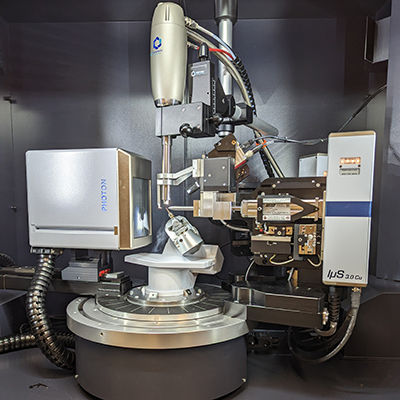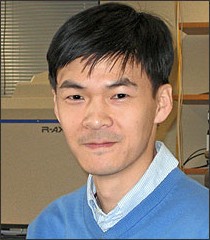X-ray Crystallography Center
The X-ray Crystallography Center was fully renovated in November 2007 and houses a single-crystal X-ray diffraction system, a brand-new Bruker D8 VENTURE diffractometer, providing X-ray diffraction tools for structural characterization of small molecules (organic, inorganic and organometallic). X-ray structure analysis of small-molecule are conducted primarily on single crystals submitted by researchers within the university. As an extension service, the facility also accepts sample submissions from research organizations outside the university.
Students are encouraged to learn to operate the instrumentation, collect data themselves, and solve their own structures. Practical training, supervision, advice, and assistance are provided by the facility director. The art and science of X-ray crystallography are introduced as a graduate/undergraduate course. Graduate students and post-docs who have completed in-house training may work independently. Undergraduate students generally work directly with the facility director.
Complete X-Ray Crystallography Center Description

Small Molecule Diffractometer
The facility maintains a state-of-the-art Bruker D8 VENTURE fully automated single crystal diffractometer, duo wavelength system with high brightness ImuS molybdenum and copper source, coupled with a PHOTON II CPAD detector. This system can obtain charge density quality data with Mo radiation and exploit all the advantages of Cu wavelength for absolute structure determination and diffraction experiments on ever smaller organic crystals. Low temperature device used is an Oxford 800 series Cryostream system with temperature range of 80-400 K. An LEICA M125 stereo zoom microscope is used to view and mount crystals. The X-ray Crystallographic Facility also includes a Crystal Growth Laboratory, equipped to aid students in obtaining crystals suitable for structure determination.
The facility has two Dell Precision workstations for data collection, structure solution and refinement. Software packages include APEX4, TWINABS, CELL_NOW, ROTAX, PLATON, WINGX, and a license for the Cambridge Structural Database™ (CSD).
Service
The X-Ray Crystallography Center operates on a 24/7 schedule.
Service is provided for all aspects of small molecule crystallography:
- Crystallization
- Sample examination and evaluation (optical and diffraction)
- Data collection and reduction
- Structure solution and refinement
- Presentation graphics preparation
- Preparation of tables and cif files for publication
- File submission to the Cambridge Structural Database™
Turn around time is highly dependent on crystal quality and size.
Key Outputs and Achievements
Liu, J.; Dai,Y.; Robinson, D.; Li, B.; Miqueu, K.; Liu, S.-Y. “Synthesis of Chiral δ‐Aminoboronic Esters by Enantio-selective Hydrogenation of 1,2‐Azaborines” Angew. Chem. Int. Ed. 2025, 64, e202504419.
Zhang, M.; Chapman, M.; Sarode, B.R.; Xiong, B.; Liang, H.; Chen, J.K.; Weerapana, E.; Morken, J.P. “Catalytic asymmetric synthesis of meta benzene isosteres” Nature 2024. 633, 90–95.
Streater, D. H.; Kennehan, E. R.; Wang, D.; Fiankor, C.; Chen, L.; Yang, C.; Li, B.; Liu, D.; Ibrahim, F.; Hermans, I.; Kohlstedt, K. L.; Luo, L.; Zhang, J.; Huang, J. “Control over Charge Separation by Imine Structural Isomerization in Covalent Organic Frameworks with Implications on CO2 Photoreduction”, J. Am. Chem. Soc. 2024, 146, 4489-4499.
Lee, W.-C. C.; Wang, D.-S.; Zhang, C.-Z.; Xie, J.-J.; Li, B.; Zhang, X. P. “Asymmetric Radical Cyclopropanation of Dehydroaminocarboxylates: Stereoselective Synthesis of Cyclopropyl α-Amino Acids” Chem 2021, 7, 1588-1601.
Documents, Manuals, Notes, and Useful Links
- Standard Operation for Beginners
- X-ray Safety Information
- Boston College Laboratory Safety
- Request form for crystal structure determination
- Smart Apex User Manual, Bruker-AXS
- Shelx-97 Manual
- CIF file help
- International table of crystallography, full text available on BC library website
- Crystal Structure Refinement: A Crystallographer's Guide to SHELXL, Dr. P. Müller
- Getting crystals Your Crystallographer will Treasure, Dr. R. Staples
- Guide to grow crystals, Dr. J. Reibenspies
- American Crystallographic Association
Acknowledgement and co-authorship policy
If this structure is used/included in any forms of publications, please remember to acknowledge NIH Award S10OD030360 for support of this work in the acknowledge section. Per NIH-wide policies, any publication that reports data collected using an S10instrument must be linked to the S10 award using MyNCBI or acknowledge the award in the body of the paper.
The crystallographer should be considered for co-authorship when the structural information is an important part of the paper and has been derived from the diffraction data.

Bo Li, Ph.D.
Director, X-ray Crystallography Center
Dr. Bo Li joined the Chemistry Department at Boston College in January 2008. He served as a staff crystallographer in the Department of Chemistry, SUNY/Albany, where he earned his Ph.D. in inorganic chemistry. A native of China, Dr. Li received his B.S. in material sciences from Tongji University and a M.S. majoring in crystal growth and crystallography at Beijing Polytechnic University. Dr. Li has collected and solved over 2000 crystal structures of inorganic and organic compounds. He has substantial experience in handling crystal samples that are liquids at ambient temperature, extremely unstable, moisture- and air-sensitive, very small, and severely disordered or twinned. His research interests focus on inorganic and organometallic chemistry of heterometallic compounds.
X-ray Crystallography Center
Bo Li, Ph.D.
Director
bo.li.5@bc.edu
617.552.1815
Merkert 209B

